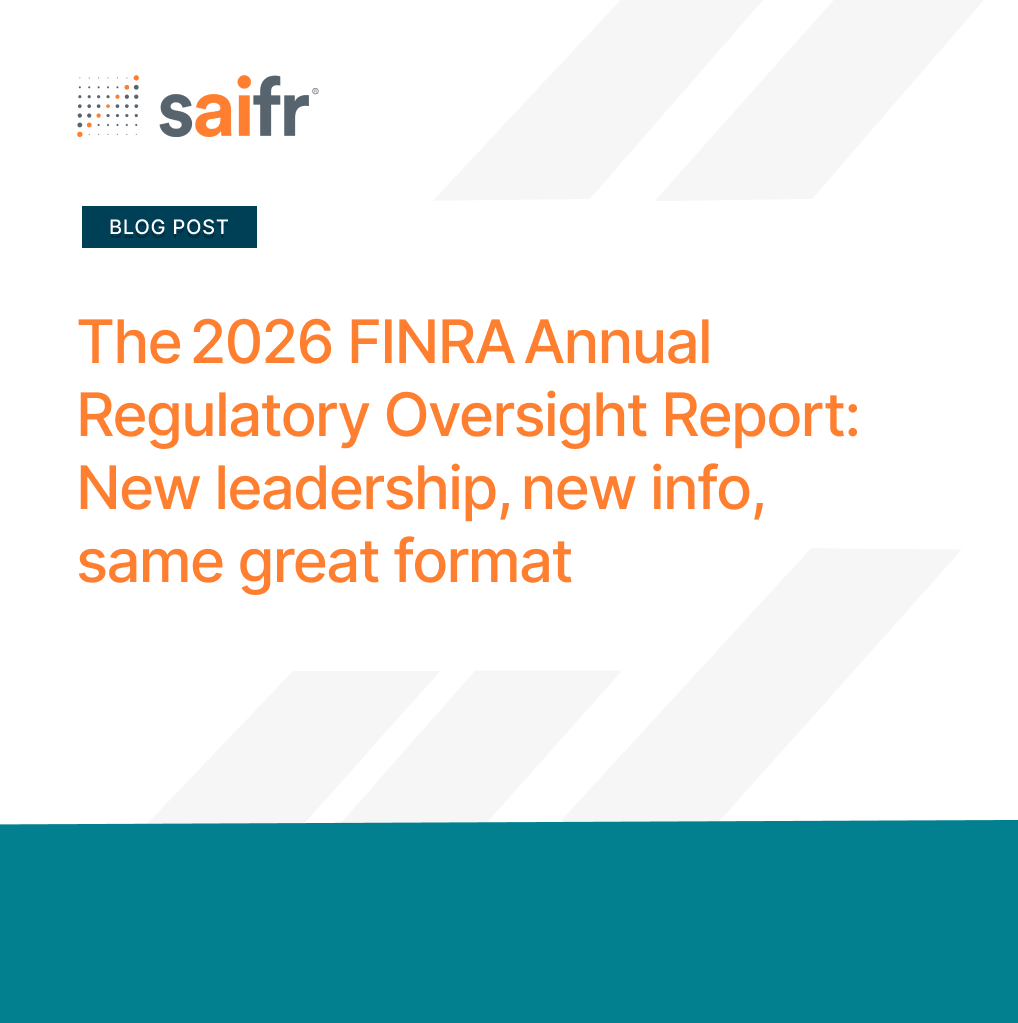Since the US regulatory landscape constantly adapts to new events, technologies, and concerns, it is important to stay abreast of where policies stand to help determine where you might want to focus your efforts and how changing regulations may impact your firm. As a compliance professional within Saifr, I regularly review reports and risk alerts from financial services regulators. Here’s my regulatory roundup of some of the communications-related findings from the Securities and Exchange Commission (SEC) and the Financial Industry Regulatory Authority (FINRA) that caught my eye in Q2.
US regulators appear to still be very much focused on three familiar themes: crypto, of course, but also the importance of recordkeeping and Regulation Best Interest (Reg BI). Beyond the big three, and perhaps due to today’s fragile banking environment, there appears to be an increased focus on consumer protection with newly proposed Consumer Protection Rule (CPC) amendments. Let’s review.
Crypto
FINRA and the National Futures Association (NFA) held a special summit in May focused on crypto assets. Crypto and blockchain experts met to share regulatory intelligence and ways to leverage the innovative technology. The gathering focused on the importance of investor protection, potential risks, and reporting and supervisory obligations associated with crypto-related activities. As a result of the summit, each organization agreed to expand their memorandum of understanding (MOU) to address crypto activities that fall within their respective regulatory purviews. This event shows the continued and urgent need by various regulators to integrate crypto and blockchain into existing frameworks of regulation.
Recordkeeping
The SEC fines continue to increase in the recordkeeping space. The SEC charged two well-known broker/dealer firms for widespread and longstanding failures by both firms and their employees to maintain and preserve electronic communications. As a result of these charges, the firms acknowledged that their conduct violated recordkeeping provisions of the federal securities laws and agreed to pay penalties of $15 million and $7.5 million, respectively. This highlights the importance of firms to control and track the use of off-channel communications such as text messaging, online messaging services, or any of the various new communications tools reps might be tempted to use. Also, this demonstrates the critical need for supervision of recordkeeping and having controls and procedures in place to mitigate this risk.
White paper → Considering AI solutions for your business? Ask the right questions.
Reg BI
Recently, FINRA expelled a broker-dealer registered firm for churning and excessively trading customer accounts in violation of Reg BI, failing to supervise its representatives, and providing false and misleading disclosures to retail customers on its client relationship summary (Form CRS). This is the second firm expulsion that has included violations of Reg BI, to date. FINRA also suspended the CEO, sending a message that supervision is ultimately the responsibility of the top. This highlights the duty of care for firms to act in the best interest of the client in terms of care, disclosure, conflict, and compliance.
Consumer protection
The final thing that caught my eye this quarter was the SEC’s proposed amendments to Rule 15c3-3 (the Customer Protection Rule). These amendments will require certain broker-dealers to increase the frequency of performance computations of the net cash owed to customers and other broker-dealers from weekly to daily. Net cash owed to customers account holders must be held in a separate reserve bank account. The SEC’s goal with this proposal is to help protect the customer if a broker/dealer were to fail.
These Q2 updates surely emphasize the seriousness of the regulators in enforcing compliance with existing regulations, adjusting regulations to respond to current economic cycles, and highlighting their continued efforts to develop ways to protect consumers within emerging areas such as crypto. We’ll see what Q3 brings.
Sources: FINRA, SEC, 2023.
The opinions provided are those of the author and not necessarily those of Fidelity Investments or its affiliates.
1096820.1.0






-1.png)